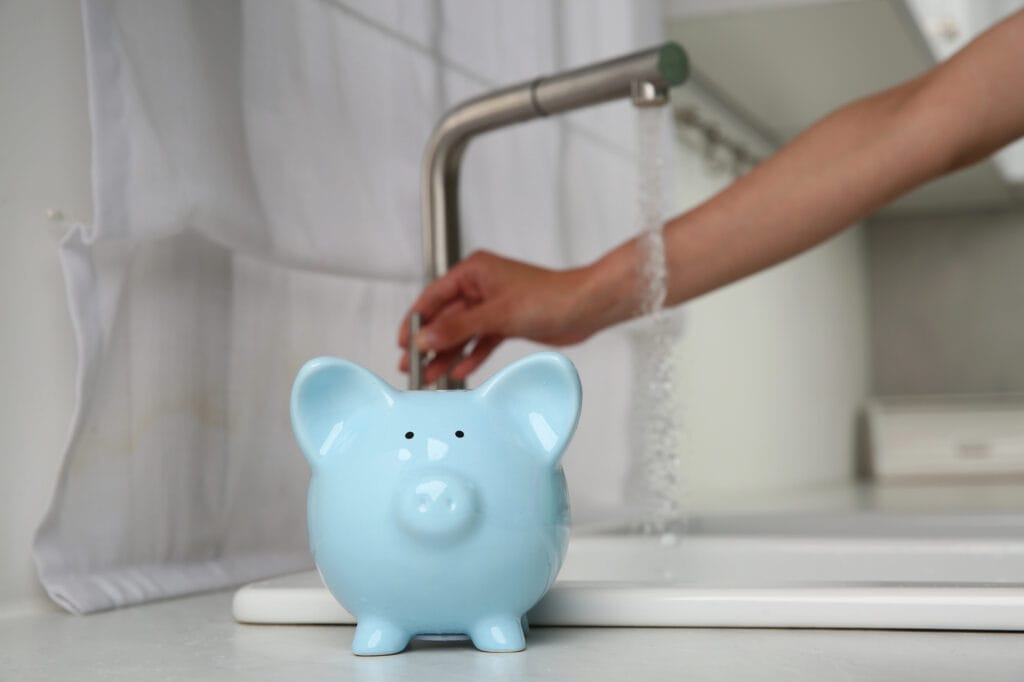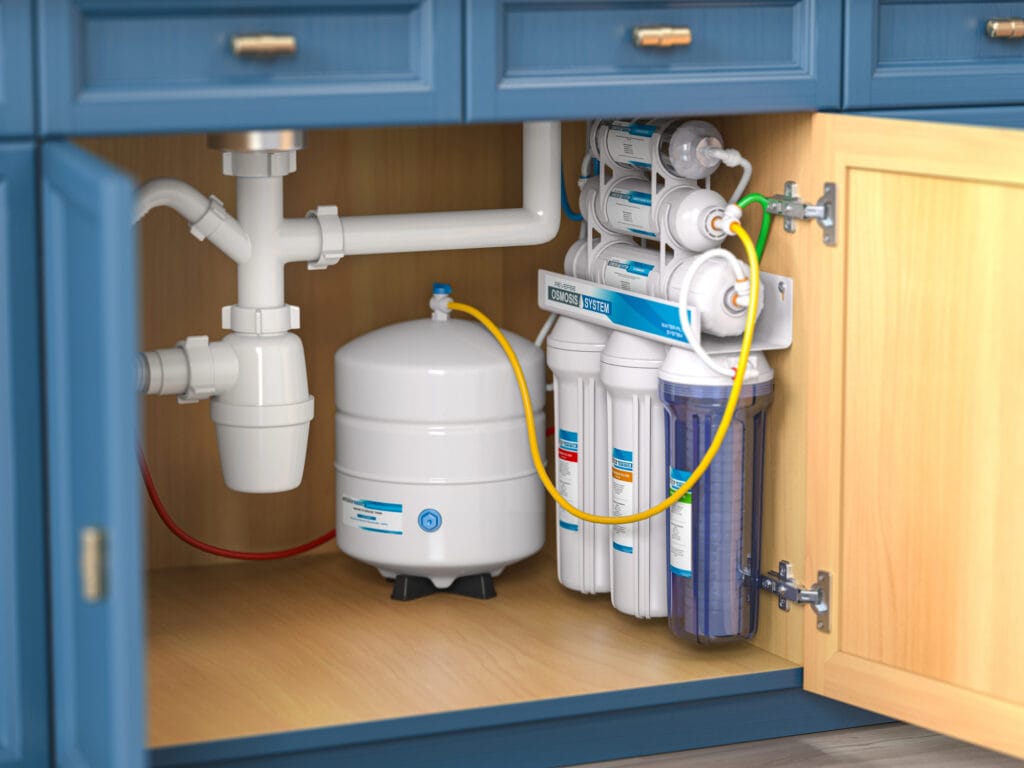There has been a lot of recent evidence about PFAS “forever chemicals” being present in town drinking water. This has been alarming information for many Australians who previously assumed tap water was safe for everyday use.
More research needs to be done about what levels are truly safe when it comes to drinking water, but in the meantime, there are a number of ways homeowners can help reduce exposure and improve tap water taste;
- Buy spring water
- Boil tap water
- Have a drinking filter tap installed
- Install a whole house water filter
A whole house water filter is a system that cleans the water entering your home right at the source. Unlike countertop or under-sink filters that treat water at a single tap, this type of system works for your entire home—so every tap, shower, washing machine, and appliance gets filtered water. It’s a convenient way to make sure the water you use every day is cleaner, safer, and better tasting.
For most Australian households, the cost to install a whole house water filtration system generally ranges from $1,000 to $5,000, depending on the type of system and level of filtration required.
Additional expenses, such as ongoing filter replacements, usually add $150 to $220 every six to 12 months.
Is investing in whole house filtration worth it? To know whether a whole house filter system makes sense for an individual household, all factors need to be taken into consideration, including cost, effectiveness in removing contaminants, and peace of mind.


What Is a Whole House Water Filter?
A whole house water filter is a filtration system installed at the main water entry point of a home. It treats all the water before it moves through pipes and reaches taps, showers, and appliances.
These systems remove a range of contaminants, such as chlorine, sediment, and chemicals, to help improve the taste and smell of the water at every outlet.
So how do home water filters actually work?
Most setups use a multi-stage process to treat water as it comes into your home from the main supply line. Common stages include
- PP sediment filter to trap dirt, sand and rust
- carbon filters for chlorine removal and odour reduction
- options for scale reduction in hard water areas
- custom options for heavy metals, or even bacteria, depending on the chosen system.
These systems are typically installed right where the main water line enters your house, that way, every drop of water flowing into your home gets filtered before it reaches any plumbing fixtures. It’s a set-it-and-forget-it kind of solution that quietly works in the background.
By the time the water reaches your taps, it’s already been treated, giving you peace of mind for drinking, cooking, bathing, and washing, supporting better water quality throughout the home.
Why Would You Want One?
People choose whole house water filters to improve water quality for drinking, cooking, and showering. These systems can reduce common contaminants like lead, copper, pesticides, bacteria, viruses, and organic compounds. Some models also address hard water minerals, such as calcium and magnesium, helping to prevent scale build-up, giving longer life to appliances.
Reducing suspended solids and corrosive elements can lead to fewer repairs and longer-lasting hot water systems, dishwashers, and washing machines.
Whole house water filters provide a simplified, cost-effective and environmentally friendly alternative to tap water. Some water supplies may contain substances such as chromium, chloramines, mercury, cadmium, trihalomethanes (THMs), VOCs, or fluoride. This can mean that occupants drink less water or spend a lot of time and money buying bottled water, spring water or jug filters.
Families dealing with skin issues like eczema or psoriasis sometimes report fewer irritations when showering or bathing with filtered water. Cleaner water can also improve the taste and odour of what comes out of the mains water supply.
What’s the Price?
The cost of a whole house water filtration system can range widely. According to recent estimates, the national average sits around $3,202, but homeowners might pay anywhere from $1,630 to $8,400 or more, depending on their needs and system type. Some advanced systems, such as reverse osmosis units, can reach up to $12,500.
Key factors affecting cost:
- System Type:
- Whole-home carbon/sediment filter: upwards of $3000
- Plus UV treatment: up to $8000
- With water softener: up to $10000
- Upgrade to Reverse Osmosis: $7,500 to $12,500
- Treatment Method:
- UV purification (which kills bacteria and viruses): up to $2,300 for both whole house and under sink types
- Water softeners: up to $3,900
- Chemical injectors: up to $2,300
- Water distillation: up to $5,600
- Labour Costs:
- Whole-house system installation: $300 – $900
- Under-sink unit installation: $185 – $470
Other expenses may include water testing ($100 – $300), plumbing updates ($150 – $850 for extensive piping), and electrical outlet installation ($156 – $550). Permits may be required and range from $30 – $500.
Ongoing costs:
- Annual filter changes for whole-house systems typically cost between $230 and $430.
- Removing old systems or repairing drywall can add $60 – $600 per instance.
Different homes and water sources (such as a well or rainwater) will often mean added costs for additional filtration stages or storage. System choice, local plumbing rates, and material quality all contribute to the total price.


Is It Worth the Money?
At first glance, a whole house water filter can seem like a big investment, but when you look at the long-term benefits and cost savings, it often pays off.
Say Goodbye to Bottled Water
If your household buys bottled water or spring water regularly, the cost adds up fast. Let’s say you’re spending $15–$20 a week, that’s over $1,000 a year. A whole house system can eliminate the need for bottled water entirely, giving you clean, filtered water from every tap without the environmental impact of using plastics.
More Convenient Than Jug Filters
Pitcher-style filters and faucet attachments can seem affordable, but they require frequent cartridge replacements and only filter a small amount of water at a time. Whole house filters remove that hassle. You get filtered water everywhere—no waiting, no refilling, and no worrying about which taps are safe to use.
A whole house water filter requires a higher upfront investment compared to tap-mounted or pitcher filters.
For households with specific water quality issues, such as sediment, chlorine, or odour, a whole house system may deliver health and comfort benefits. The up-front investment can be justified if better water quality is required for sensitive skin, appliances, or cooking.
Simple Tips Before You Buy
Every local water supply is different, so it’s important to know what the water needs are to match the right system. Some systems remove sediment and chlorine, while others target specific contaminants like lead or bacteria.
Compare system sizes and installation requirements. Not all houses need the largest unit; smaller households might save on an entry-level system.
Ask a plumber these questions before making a final decision:
- What maintenance does this system need?
- How often do filters or parts need replacing?
- Are there hidden installation costs?
- Does the system affect water pressure?
Check warranty and after-sales service options. A longer warranty or local service contact can avoid hassle in the future.
Think about available space, as some systems are large and need room for filters and valves. Installation location, such as outdoors or under the house, can matter for access and weather protection.
Not sure where to start? If you live locally, you can get a water filter installed in Newcastle or get a water filter installed on the Central Coast with help from our expert team. Clean water is just a call away!
Wrap Up: Clean Water, Happy Home
While the upfront cost of a whole house water filter can range from a few hundred to several thousand dollars, the long-term savings and quality-of-life improvements make it a smart investment for many households. You’ll spend less on bottled water, reduce maintenance on appliances, and enjoy cleaner water from every tap.
People often choose systems based on water quality needs, maintenance requirements, and budget. The effectiveness of the system depends on factors such as the number of filtration stages and the type of filters used.
Common benefits include:
- Improved taste and odour of water
- Reduced contaminants like chlorine and sediment
- Lower scale buildup in appliances
Investing in whole house filtration brings cleaner water from every tap. With a variety of options and prices, each household can find a solution that fits their needs.
